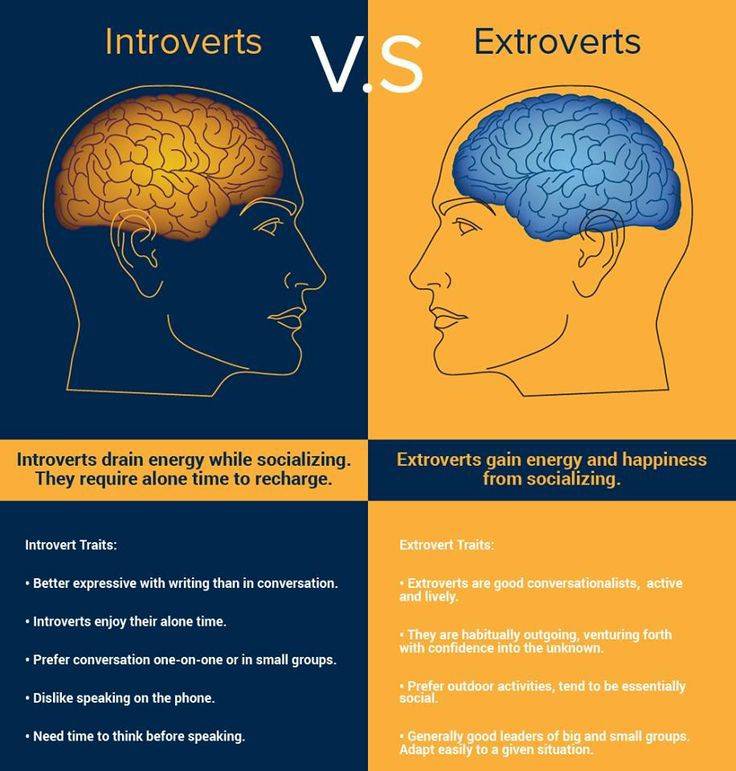Introvert vs. Extrovert:
Knowing the Differences...........
The terms "introvert" and "extrovert" are widely used to describe personality types and social inclinations. First introduced by Carl Jung, these concepts highlight how individuals recharge, interact with others, and process the world around them. Both introversion and extroversion exist on a spectrum, and most people exhibit a blend of traits from both. However, understanding these differences can help us appreciate diverse social styles and leverage each personality type's strengths.
What is an Introvert?
Introverts tend to focus on their inner world of thoughts and emotions. They may find energy in solitude or small, familiar gatherings rather than large social settings. Introverts aren’t necessarily shy or anti-social; they simply prefer environments where they can reflect and recharge. Key characteristics often associated with introversion include:
Preference for Solitude: Introverts often need alone time to recharge after social interactions. They might enjoy activities like reading, writing, or spending time in nature.
Deep Conversations: Introverts may prefer meaningful conversations with a few close friends rather than surface-level small talk with many people.
Focus on Reflection: They tend to think carefully before speaking and may be more introspective, taking time to process their thoughts and feelings.
Observant and Introspective: Introverts often notice details and reflect on the world around them, bringing a unique perspective to conversations and problem-solving.
What is an Extrovert?
Extroverts, on the other hand, are outward-focused and gain energy from external interactions. They often feel revitalized after spending time with others and are usually more expressive and outgoing. While introverts find energy in solitude, extroverts thrive in social settings. Key characteristics of extroversion include:
Outgoing and Sociable: Extroverts enjoy being around others, meeting new people, and engaging in group activities. They’re usually more comfortable initiating conversations and may feel energized in large gatherings.
Talkative and Expressive: Extroverts are often enthusiastic communicators who are comfortable speaking their mind. They may enjoy being the center of attention and are usually more open with their emotions.
Action-Oriented: Extroverts often make quick decisions and prefer doing rather than pondering. They’re often enthusiastic about trying new activities, making them well-suited to environments that demand quick thinking and adaptability.
Drawn to Social Stimulation: Extroverts seek out environments where they can interact with others, from social gatherings to work settings that involve teamwork and collaboration.
Differences in Social Preferences
The most significant difference between introverts and extroverts is how they recharge. While extroverts feel energized by social interactions, introverts may feel drained after prolonged socializing. This difference shapes their preferences and choices:
Social Activities: Introverts might prefer small groups or one-on-one interactions, while extroverts tend to enjoy large gatherings and thrive in diverse social settings.
Work Styles: Introverts often work well in quiet, focused environments, preferring tasks that allow for concentration. Extroverts, by contrast, thrive in collaborative settings and enjoy brainstorming and teamwork.
Decision-Making: Introverts may take time to reflect on options before deciding, while extroverts often make decisions quickly and are comfortable with spontaneity.
The Ambivert: A Blend of Both
Many people don’t fit squarely into the introvert or extrovert category. Instead, they fall somewhere in the middle and are known as "ambiverts." Ambiverts have a balance of introverted and extroverted tendencies and can adapt to various social situations, making them particularly versatile.
Strengths of Introverts and Extroverts
Both introverts and extroverts bring unique strengths to relationships, workplaces, and social circles.
Strengths of Introverts:
Good listeners and thoughtful responders
Deep thinkers with a detail-oriented approach
Often highly creative and reflective
Calm and composed in high-stress situations
Strengths of Extroverts:
Effective communicators and motivators
Thrive in dynamic, fast-paced environments
Excellent at networking and relationship-building
Naturally energetic and enthusiastic
Misconceptions and Stereotypes
Despite their differences, introverts and extroverts are often subject to stereotypes. Introverts are sometimes mislabeled as shy or anti-social, while extroverts are unfairly judged as overly loud or superficial. In reality, each personality type has unique traits that can contribute positively to both personal and professional settings.
Understanding introverts and extroverts can deepen our appreciation for different personality styles. Both types offer valuable strengths and perspectives, and most people possess a mix of both traits. Recognizing and respecting these differences can foster stronger relationships and a more inclusive environment where each person can contribute according to their strengths. Whether introvert, extrovert, or ambivert, every personality type adds depth and diversity to our world.
Thanks for reading 📚
MOÃSE




No comments yet
Be the first to share your thoughts!